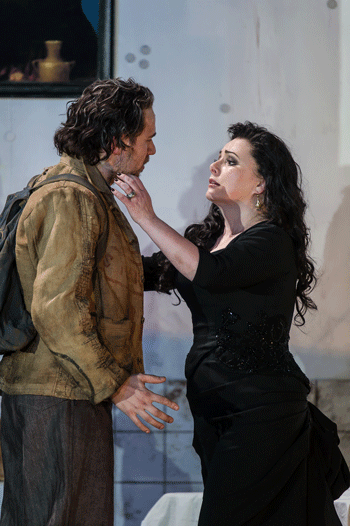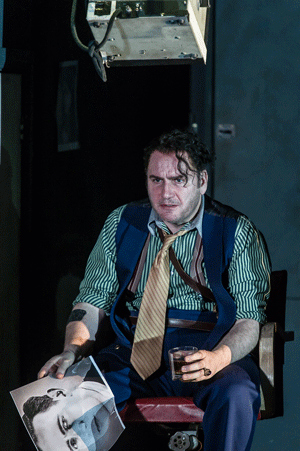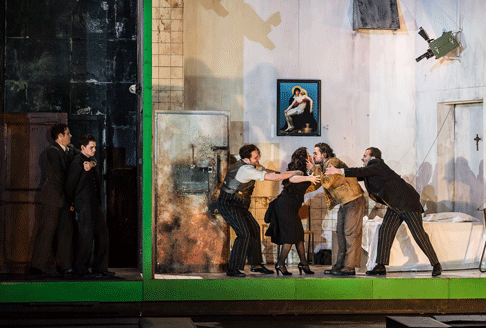Recently in Performances
English Touring Opera are delighted to announce a season of lyric monodramas to tour nationally from October to December. The season features music for solo singer and piano by Argento, Britten, Tippett and Shostakovich with a bold and inventive approach to making opera during social distancing.
This tenth of ten Live from London concerts was in fact a recorded live performance from California. It was no less enjoyable for that, and it was also uplifting to learn that this wasn’t in fact the ‘last’ LfL event that we will be able to enjoy, courtesy of VOCES8 and their fellow vocal ensembles (more below …).
Ever since Wigmore Hall announced their superb series of autumn concerts, all streamed live and available free of charge, I’d been looking forward to this song recital by Ian Bostridge and Imogen Cooper.
Although Stile Antico’s programme article for their Live from London recital introduced their selection from the many treasures of the English Renaissance in the context of the theological debates and upheavals of the Tudor and Elizabethan years, their performance was more evocative of private chamber music than of public liturgy.
Evidently, face masks don’t stifle appreciative “Bravo!”s. And, reducing audience numbers doesn’t lower the volume of such acclamations. For, the audience at Wigmore Hall gave soprano Elizabeth Llewellyn and pianist Simon Lepper a greatly deserved warm reception and hearty response following this lunchtime recital of late-Romantic song.
For this week’s Live from London vocal recital we moved from the home of VOCES8, St Anne and St Agnes in the City of London, to Kings Place, where The Sixteen - who have been associate artists at the venue for some time - presented a programme of music and words bound together by the theme of ‘reflection’.
'Such is your divine Disposation that both you excellently understand, and royally entertaine the Exercise of Musicke.’
‘And there was war in heaven: Michael and his angels fought against the dragon; and the dragon fought and his angels, And prevailed not; neither was their place found any more in heaven … that old serpent … Satan, which deceiveth the whole world: he was cast out into the earth, and his angels were cast out with him.’
There was never any doubt that the fifth of the twelve Met Stars Live in Concert broadcasts was going to be a palpably intense and vivid event, as well as a musically stunning and theatrically enervating experience.
‘Love’ was the theme for this Live from London performance by Apollo5. Given the complexity and diversity of that human emotion, and Apollo5’s reputation for versatility and diverse repertoire, ranging from Renaissance choral music to jazz, from contemporary classical works to popular song, it was no surprise that their programme spanned 500 years and several musical styles.
The Academy of St Martin in the Fields have titled their autumn series of eight concerts - which are taking place at 5pm and 7.30pm on two Saturdays each month at their home venue in Trafalgar Square, and being filmed for streaming the following Thursday - ‘re:connect’.
The London Symphony Orchestra opened their Autumn 2020 season with a homage to Oliver Knussen, who died at the age of 66 in July 2018. The programme traced a national musical lineage through the twentieth century, from Britten to Knussen, on to Mark-Anthony Turnage, and entwining the LSO and Rattle too.
With the Live from London digital vocal festival entering the second half of the series, the festival’s host, VOCES8, returned to their home at St Annes and St Agnes in the City of London to present a sequence of ‘Choral Dances’ - vocal music inspired by dance, embracing diverse genres from the Renaissance madrigal to swing jazz.
Just a few unison string wriggles from the opening of Mozart’s overture to Le nozze di Figaro are enough to make any opera-lover perch on the edge of their seat, in excited anticipation of the drama in music to come, so there could be no other curtain-raiser for this Gala Concert at the Royal Opera House, the latest instalment from ‘their House’ to ‘our houses’.
"Before the ending of the day, creator of all things, we pray that, with your accustomed mercy, you may watch over us."
The doors at The Metropolitan Opera will not open to live audiences until 2021 at the earliest, and the likelihood of normal operatic life resuming in cities around the world looks but a distant dream at present. But, while we may not be invited from our homes into the opera house for some time yet, with its free daily screenings of past productions and its pay-per-view Met Stars Live in Concert series, the Met continues to bring opera into our homes.
Music-making at this year’s Grange Festival Opera may have fallen silent in June and July, but the country house and extensive grounds of The Grange provided an ideal setting for a weekend of twelve specially conceived ‘promenade’ performances encompassing music and dance.
There’s a “slide of harmony” and “all the bones leave your body at that moment and you collapse to the floor, it’s so extraordinary.”
“Music for a while, shall all your cares beguile.”
The hum of bees rising from myriad scented blooms; gentle strains of birdsong; the cheerful chatter of picnickers beside a still lake; decorous thwacks of leather on willow; song and music floating through the warm evening air.
Performances

03 Mar 2014
Torn Between Rival Loyalties
Handel’s great opus, Rodelinda, at English National Opera on
Friday night was the latest in the Coliseum’s recent run of new and
co-produced productions, and also renowned director Peter Jones’ latest foray
into the world of opera.
A full-ish house for the first night seemed from the
start inclined to be indulgent and supportive (does a Friday night after a long
week in the office in London help a new production? Discuss......) and was
helped along by what sounded suspiciously like a small claque cheering
from the very first da capo aria (“let’s get this lot going chaps”?)
without, it has to be said, that much cause at that particular moment.
 John Mark Ainsley as Grimoaldo
John Mark Ainsley as Grimoaldo
Never mind, the audience did not need much further encouragement to applaud
as we were that night treated to one of the finest expositions of handelian
singing across the vocal spectrum that we’ve heard for quite a while. A
superb collection of the best British singing talent gathered under one roof to
show the world how Handel should — ought — to be sung. John Mark Ainsley,
(Grimoaldo), Susan Bickley (Eduige), Iestyn Davies (Bertarido), and Rebecca
Evans (Rodelinda) took on the leading roles in this tale of loyalty, power,
love and lust and gave full measure at every turn. They were supported no less
ably by Richard Burkhard (Garibaldo), Christopher Ainslie (Unulfo) and Matt
Casio (a non singing, but certainly acting Flavio). One could spend paragraphs
praising each performer’s intelligent and musical interpretations, but
suffice to say that there was not one weak link in this chain of excellence
although inevitably both Evans and Davies, as chief protagonists and with the
most sublime and ferocious arias to their credit, did receive the loudest and
longest ovations come the end of three plus hours of Mr Handel at his best. And
each singer of course supported by the dash, drive and commitment to baroque
style that Christian Curnyn supplied from the pit.
I mentioned loyalty as a major driver in the plot: it came through again and
again both within the personal relationships of the characters and in their
wider political and philosophical concerns but it was loyalty much closer to
home which worried this writer most. One wishes only success and financial
security for English National Opera as it goes forward from some pretty torrid
times; one wishes that Handel’s greatest works should become loved by ever
larger audiences in ever more numerous productions; one wishes that more opera
house orchestras could adapt as stylishly to baroque details as does ENO’s;
and one wishes our British theatrical production talents ever more plaudits
both here and overseas as they bring new ideas and angles to old favourites.
However, the elephant in the room on Friday night, it must be said, was this
very thing. Peter Jones has already garnered many plaudits for his theatrical
insight and challenging productions around the world, but on leaving the
theatre on Friday night it became clear that this production was splitting
people down the middle.
 A scene from Rodelinda
A scene from Rodelinda
A straw poll aftewards produced extremes of reaction:
“marvellous, clever, thought-provoking” at one end and “poor singers, how
did they produce such excellence within such dire, distracting drivel?” at
the other. To be fair, he and his team did (mostly) give the singers both space
and focus on the stage for their big numbers; it was all the stuff in between
that in this writer’s opinion was either indulgent, patronising or plain
wrong. Once again, poor Mr Handel has suffered from a director’s inability to
trust the music, an inability to understand that emotion, conflict and
psychological evolution is already there — on the score, within the bars and
notes, riding on the swell and trough of fine singing. Others will disagree, no
doubt; some will say it’s a modern masterpiece; only the audiences of the
future will decide and let’s hope they do in droves. What is without doubt is
that Rodelinda will survive it all and with singers as good as we
heard in the Coliseum we can rest assured that Mr Handel will always have the
last word.
Sue Loder
Until 15 March. Tickets: 020 7845 9300; www.eno.org


